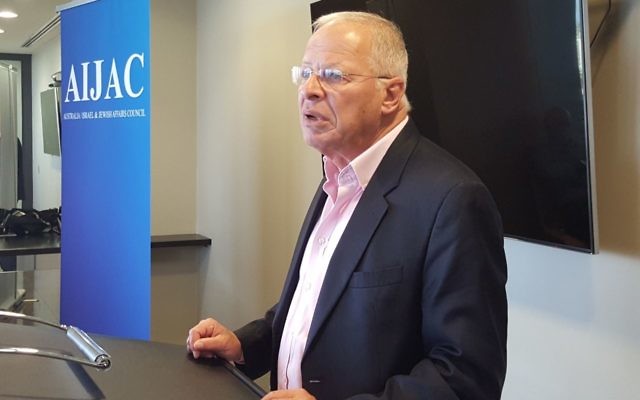Ya’ari: Violence not an intifada
CONCERNS that the current wave of Palestinian terrorism in Israel is the start of a third intifada are premature, one of Israel’s top foreign affairs analysts said in Sydney last week.
CONCERNS that the current wave of Palestinian terrorism in Israel is the start of a third intifada are premature, one of Israel’s top foreign affairs analysts said in Sydney last week.
Ehud Ya’ari is the senior Middle East commentator for Israel’s Channel Two news, the author of eight books on the Israeli-Arab conflict and a fellow at the Washington Institute for Near East Policy.
Addressing an Australia/Israel & Jewish Affairs Council luncheon, the co-author of the 1990 book Intifada said the current wave of violence differed from the intifadas of 1987 and 2000.
“This is no intifada, so far. It doesn’t have command,” he said.
“In the First Intifada, it took two to three days to form a unified command. The Second Intifada had a commander – his name was Yasser Arafat, and he was running the intifada from the presidency in Ramallah. This time, there is no central command orchestrating, so far.”
He added that the majority of the Palestinian population in the West Bank do not want a third intifada.
“The public feels that they were burned by the previous intifadas,” he said.
“They view Arafat’s intifada as a catastrophe, as a fiasco. All those who are involved in violence now belong to the generation that do not remember the Second Intifada of 2000.”
But he did warn that there is a growing level of coordination between armed groups in Palestinian refugee camps who are “usually not on good terms with one another”.
He said the Palestinian Authority has “completely lost control” over these gangs, who have no respect for the PA or its President Mahmoud Abbas.
“Most of the stabbings that we saw in the past week emanated from the refugee camps, these gangs,” he said.
This loss of control, combined with the Israeli government’s failure to control a small number of extreme right-wing settlers who have been attacking Palestinian villages, has created a void “which has invited” the current violence, he explained.
Further flaming the tensions is the PA’s lie that Israel plans to change the status quo on the Temple Mount, he added.
“I think that there could be a prospect of calming it down if the Palestinian Authority took a more clear-cut stand against the stabbings and violence in general, and if there is more denunciation and condemnation of these acts of terrorism coming from abroad,” he said.
GARETH NARUNSKY


comments